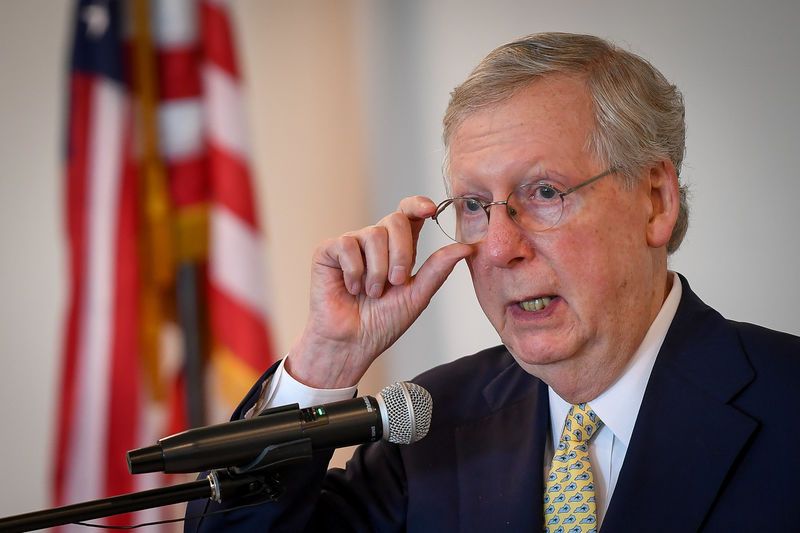By Geoffrey Smith
Investing.com -- Senate Leader Mitch McConnell thwarts Donald Trump’s plan for higher stimulus payments, the U.K. approves the AstraZeneca/Oxford University vaccine, and Bitcoin reaches another all-time high. Here’s what you need to know in financial markets on Wednesday, December 30th.
1. McConnell defies Trump’s stimulus call
President Donald Trump’s efforts to increase the part of the recent $900 billion stimulus package that is paid directly to households ran into the sand, as Senate Majority Leader Mitch McConnell refused to schedule a quick vote on the motion that passed the House of Representatives earlier in the week.
McConnell has now combined that initiative into a new bill that would combine increased payments with other provisions that House Democrats are sure to reject, such as the repeal of Section 230 of the Communications Decency Act (which gives social media platforms protection from legal liability for the content posted by their users) and a commission to look into Trump’s claims of election fraud which have been thrown by over 50 courts across the U.S. so far).
As such, the level of direct payments is likely to stay at $600, rather than the $2,000 demanded by Trump and approved by the House.
2 AstraZeneca vaccine gets first approval
The U.K.’s Medicines and Healthcare Products Regulatory Agency approved the use of the Covid-19 vaccine developed by AstraZeneca (LON:AZN) and the University of Oxford.
It’s the first formal approval for a vaccine which appears to be slightly less effective against the disease than those developed by Pfizer-BioNTech and Moderna (NASDAQ:MRNA), but which is set to play a much broader role in immunizing the world’s population, given that the company is selling it at cost while the pandemic continues, and can be stored at normal refrigeration temperatures, easing the challenge of mass distribution.
The move comes as U.K. hospitals are starting to run out of capacity for Covid-19 patients. Germany, meanwhile, registered over 1,000 deaths in a single day from Covid-19 for the first time.
3. Stocks set to rebound
U.S. stock markets are set to open higher, after a modest setback late on Tuesday in response to Senate Leader McConnell’s effective blocking of higher stimulus payments.
By 6:30 AM ET (1130 GMT), Dow Jones futures were up 111 points, or 0.4%, while S&P 500 futures were also up 0.4% and Nasdaq 100 futures were up 0.3%.
Corporate newsflow remains at a trickle, but there will be U.S. data in the shape of the Chicago Purchasing Managers Index at 9:45 AM ET and November’s existing home sales figures at 10 AM.
4. Digital currencies set fresh highs
Bitcoin continued its triumphant march higher, topping $28,000 for the first time against a background of fading trust in the dollar, whose long-term debasement through the U.S.’s enduring current account and budget deficits is set to accelerate.
By 6:30 AM ET, Bitcoin was trading at $27,921, up 4.7% on the day, having earlier traded as high as $28,587.
The fundamentals for the digital asset remain the same: no country will accept taxes to be paid with it, and merchants overwhelmingly refuse to set prices in something with such a volatile price. However, its lack of practical applications is being overshadowed by an ever-broader willingness on the part of institutional money managers to speculate on it, reassured by the prospect of Bitcoin supply remaining essentially fixed.
Bitcoin isn’t the only digital asset currently enjoying itself. Ethereum has rallied over five-fold this year, although it was essentially flat on Wednesday at $728.81.
5. Last U.S. oil inventories of the year
The price of crude oil, which has lots of practical applications, rebounded modestly overnight, supported by American Petroleum Industry data showing an unexpectedly large drop in U.S. crude inventories.
The U.S. government’s inventory data are due at 10:30 AM ET, as usual. Analysts warn against reading too much into the last weekly data of the year, which tend to be distorted by accounting and tax issues.
By 6:30 AM, U.S. crude futures were up 0.8% at $48.38 a barrel, while Brent futures were up 0.7% $51.59 a barrel.
